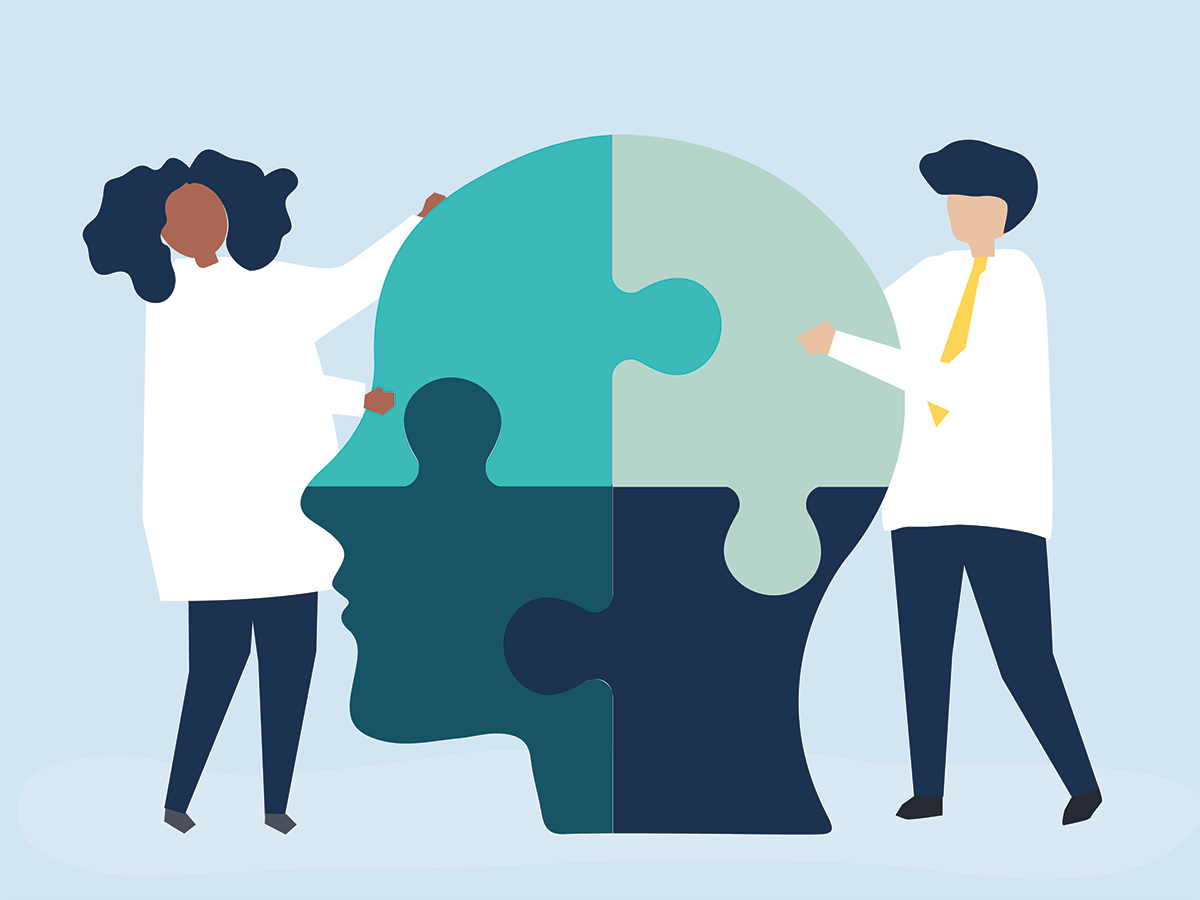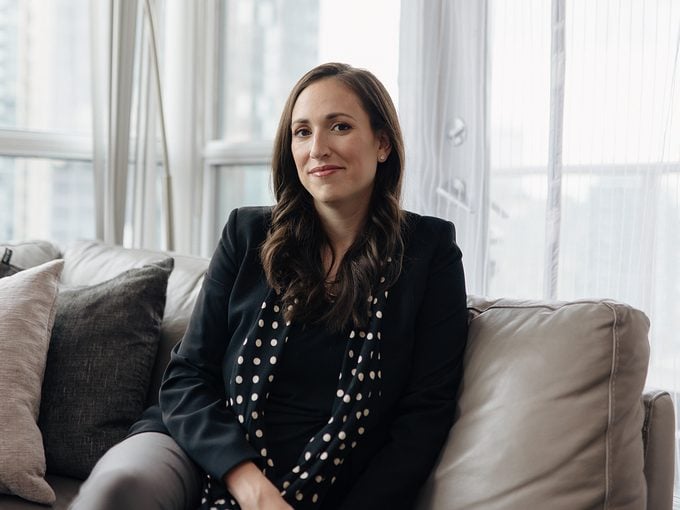How a Mental Health Gym Can Transform Your Emotional Well-Being

To improve your physical endurance, build up muscle or just bliss out on those exercise-induced endorphins, you can head to the gym or tune in to an online—workout. But what if you could take the same approach to boosting your mental fitness?
Over the past two years, mental health gyms, where memberships get you access to physical and mental health classes (think meditation, mindfulness, journaling, yoga, group talk therapy and individual sessions), have taken off in the United States and United Kingdom. In 2020, the Toronto-based clinical and health psychologist Dr. Kim Edwards launched one of Canada’s first iterations.
Edwards previously worked at McMaster Children’s Hospital, where she built a program to treat pediatric chronic pain. She was on maternity leave when COVID hit. Seeing the rapid decline in Canadians’ mental health—almost 20 percent of Canadians screened positive for generalized anxiety disorder and/or major depressive disorder, according to a spring 2021 survey conducted by the Public Health Agency of Canada—Edwards decided to launch a remote private practice: the mental health gym Mindfit. “Demand for therapists was, and still is, so high. But I was very much focused on my practice having a different feel and flavour.”

What is a mental health gym?
I don’t think there’s a single or widely accepted definition, but most are trying to rethink how mental health services are perceived and delivered. The entire process of seeking out psychological services is imbued with medical undertones—you’re a patient, you’re seeking treatment for a disorder from a clinician. Can you imagine if those terms were being used at your local gym? Of course not.
When I started my private practice, I wanted to do things differently. I wanted the concept of mental health support to be accessible, destigmatized and non-judgmental. I thought, what better way than to encourage people to think about mental health improvement the same way we think about our physical health improvement. So, at our practice we don’t have clinicians, we have coaches. We don’t have treatment plans, we have programs. We don’t have appointments, we have workouts. We don’t have patients, we have members. We embed that language into everything we do.
Right—so taking care of your mental health becomes as straightforward and reflexive as taking care of your physical health?
Exactly. We should be taking care of our mental health in the same way we’re taking care of, say, our dental health. It’s acceptable to miss a day of work because you’re feeling physically sick. Why is it not acceptable to miss a day of work because you’re not feeling mentally well? People should be able to say, “I’m feeling terribly stressed. And I just need to go for a walk and connect with some friends and do some mindfulness today.” But we are unfortunately far from that point.
It’s fair to say most people seek psychological help when they’re already in crisis. How do we make the shift to think of mental wellness as something that deserves consistent attention and tending?
So, in the past, the field of psychology was very much focused on how to get people from a minus-five to a zero—i.e., from a state of anxiety, depression and stress to a neutral, normal state. But now we also ask, how do we get people to go from zero to a plus-five, a state where we flourish? Like with physical health, that takes ongoing effort. Sleep, diet, exercise for sure, but also mental fitness workouts, which are evidence-based practices like mindfulness, relaxation, realistic thinking and connecting with others.
So, you could come to a mental health gym because you want to learn specific skills to continue to build resilience, and you want to learn strategies to cope with stress and face the challenges of the past couple years, which have been extremely difficult for all of us. You don’t have to wait until you’re at a minus-five to reach out for support.
And yet, many people pay attention only when their mental health is clearly deteriorating. Even then they don’t always get help.
Listen, we’ve got a long way to go to reduce the stigma around addressing mental health. Having more places that are designed to be both accessible and offer time-limited treatments might help.
Also, shifting our mindset. Most people prefer to take, say, vitamins rather than antibiotics to maintain health. There are strategies that I see as our [mental health] vitamins. Mindfulness and connecting with friends and doing yoga and movement and learning realistic thinking strategies and putting belly breathing in your life—these are not strategies that take a long time to do, but they’re very effective.
And honestly, who doesn’t want to be living in a plus-5 state?
That’s what positive psychology is all about. Dr. Martin Seligman launched a whole new way for us to explore which character strengths and virtues and values are universal. They transcend cultures, gender, socioeconomic status, and they allow people to thrive and live meaningful, resilient lives. Research shows that about 50 percent of the variance in your well-being is due to your genetics, and then there’s another 10 percent that’s due to your circumstances, like where you live, whether you’re married or single, your age, your gender, all that kind of stuff. But that leaves about 40 percent variability. And so, well-being can be influenced by our everyday practices, like sleep, diet, exercise, mindfulness, realistic thinking and connecting with our friends. Even gratitude practices. You don’t have to spend 10 hours a day focused on this stuff.
How are mental health gym workouts different from traditional therapy sessions?
We are essentially providing comprehensive psychological services, but we’re trying to do it in a destigmatized, accessible, compassionate and structured manner. They can be less time-intensive than traditional therapy sessions, and less costly. It’s where people are learning skills and applying them to everyday life. We want people to leave our programs with a toolbox of strategies for getting and staying in emotional shape. And we want them to use those strategies, to embed them in their daily lives so they can learn to manage future obstacles.
When treatment is unstructured, it can go on indefinitely, without clear goals or objectives. There’s definitely a place for long-term therapy for certain challenges and individuals. However, a lot of people would benefit from a short series of sessions to learn strategies and aim for results that are tangible and measurable.
Is it less daunting for people, too, if they know there’s a beginning and an end?
Absolutely. I do a lot of work with kids and teens. And one of the things they really appreciate from the first time we meet is knowing that there’s a structured plan and an end goal. They participate in about eight to 12 weekly sessions. And they leave with a binder of handouts, which becomes their toolbox of strategies and skills.
It’s clear we’re living through a mental health crisis. How can mental health gyms help?
Resilience doesn’t mean you never have stress or challenge in life. It means you’re someone who is able to bounce back from a difficult situation. What mental health gyms are trying to do is boost our psychological immune system and give people the tools to be resilient. And then, when the next bump comes along, we have some strategies and ways to realistically think about and engage with the situation.
Now that you know about mental health gyms in Canada, learn why one woman celebrates her birthday with therapy.




